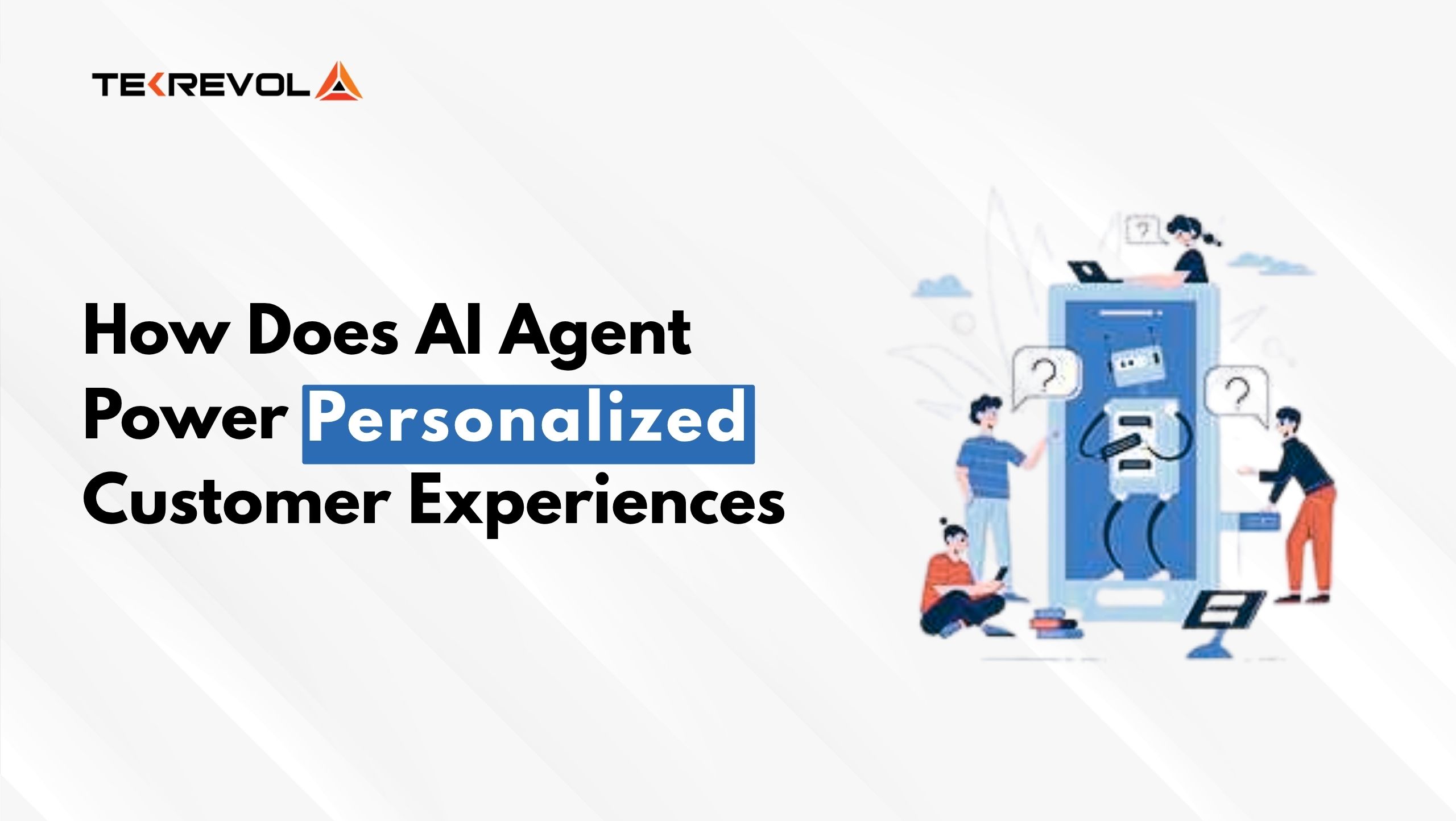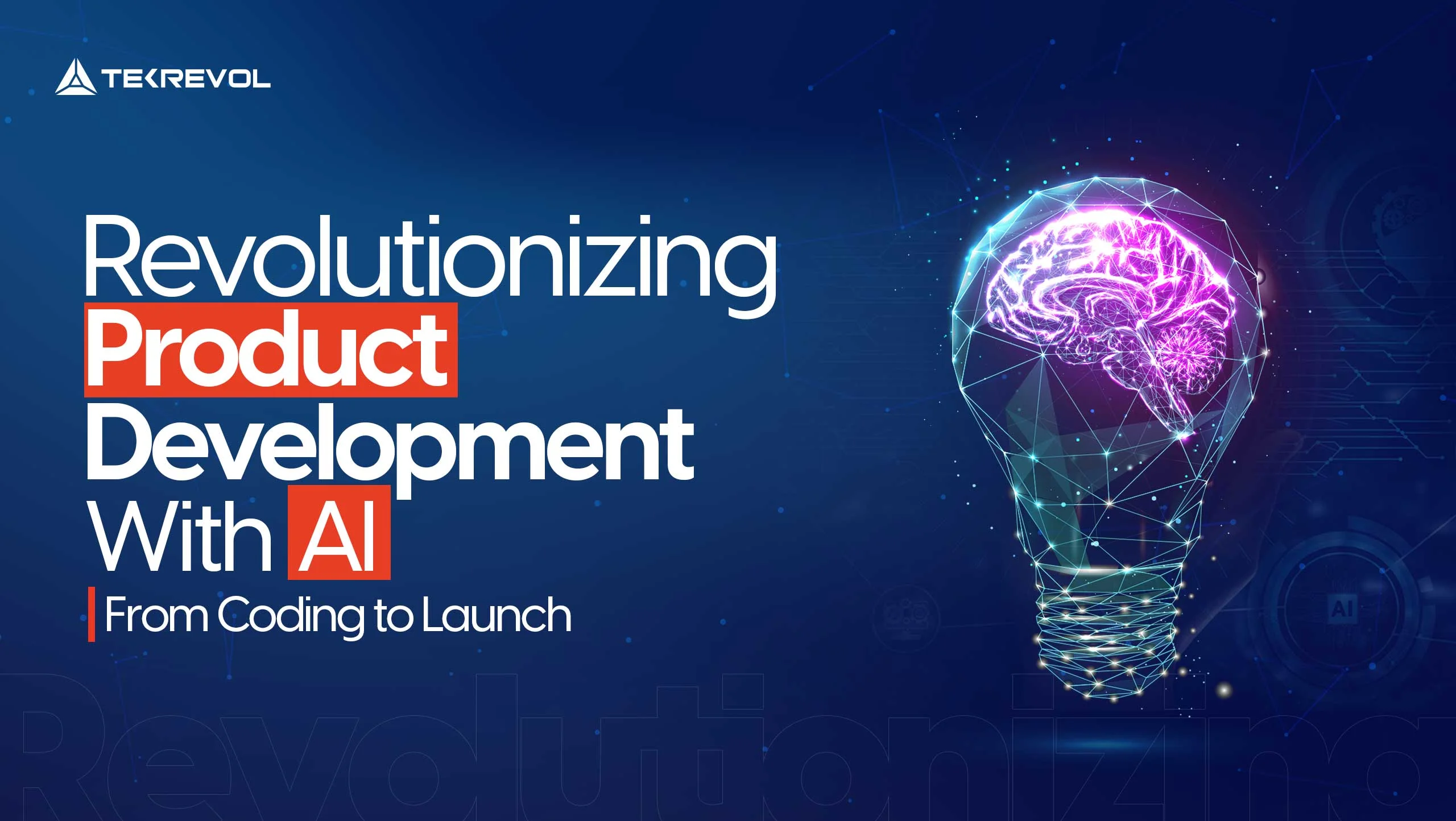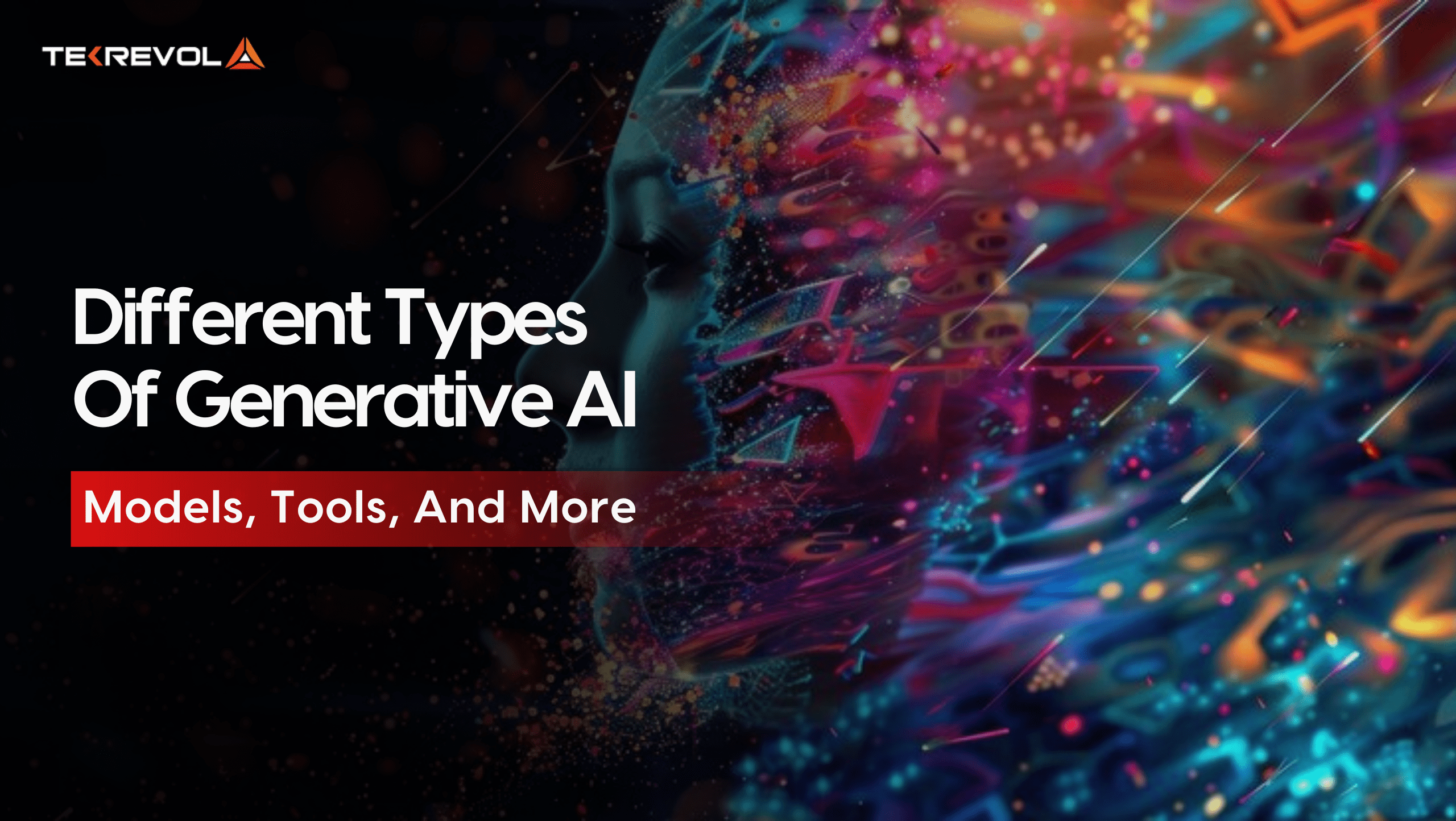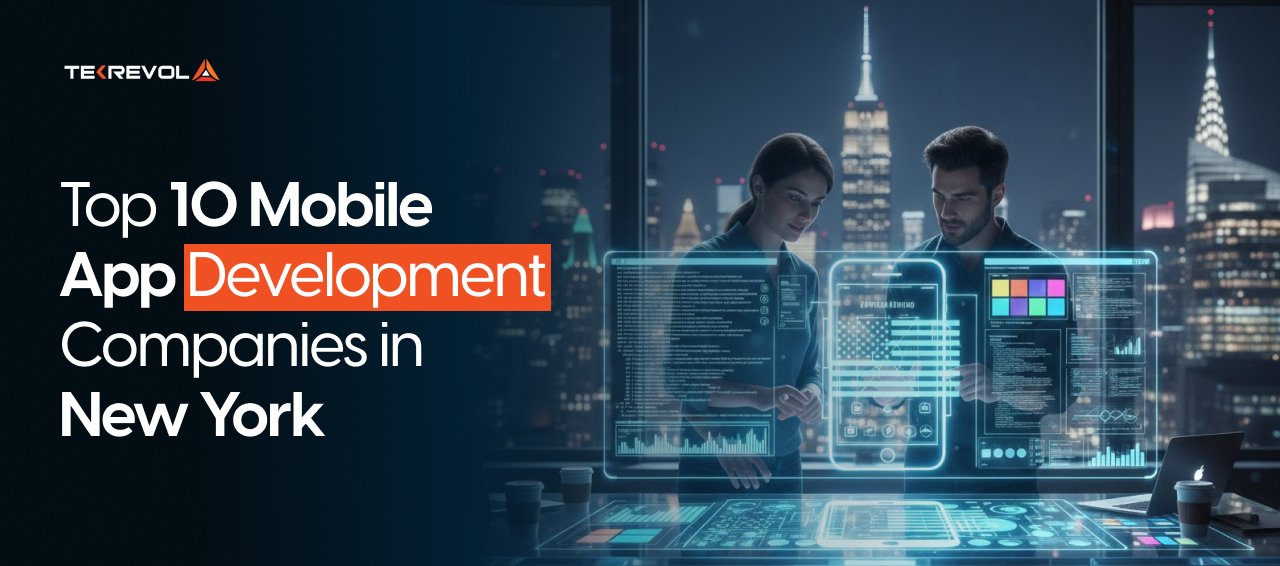According to Salesforce, 73% of customers expect brands to understand their needs; yet, most service teams still rely on outdated systems or scripted bots, resulting in slow replies and endless ticket loops.
This is where AI customer experiences are raising the bar. Built on LLMs, memory, and contextual reasoning, it predicts, adapts, and improves time to deliver personalized customer experiences.
Leading brands across major industries including healthcare and banking now rely on AI agents to handle millions of interactions quickly saving their teams from burnout, attracts loyalty and reduce service costs.
In this guide, we’ll walk you through how AI agents work, why they’re different from chatbots, and how you can apply them to improve your customer journey.
What is Agentic AI For Customer Service?
An AI agent in customer experience is a goal-driven system that understands user intent and completes tasks without relying on rigid scripts.
Unlike chatbots or voice assistants, these agents use LLMs, memory, and natural language processing services to learn from user interactions, recall past behavior, and adjust based on the customer’s needs. This makes them perfect for customer service tasks that need more than yes/no answers.
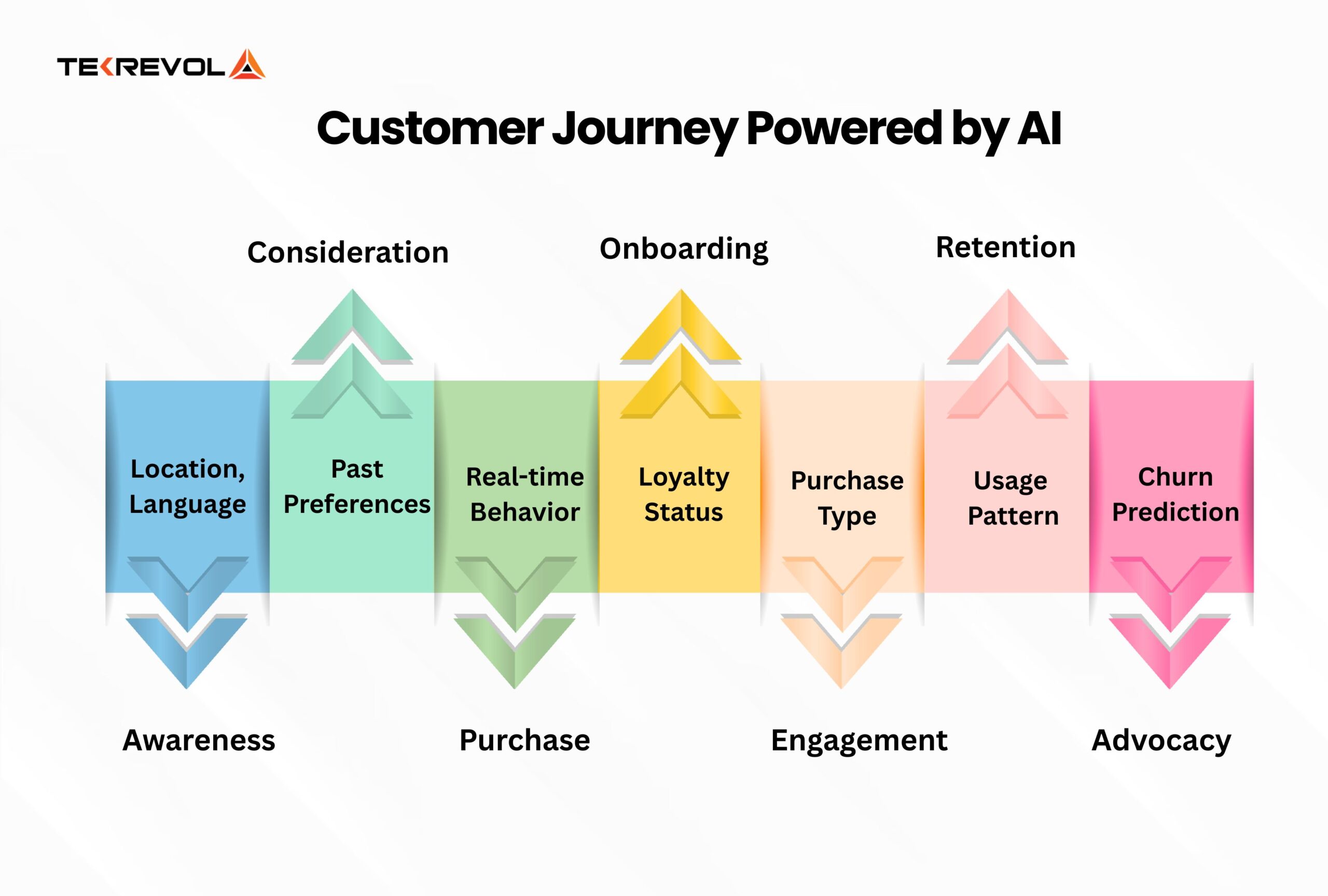
For example, an agent can detect frustration, change its tone, or guide a customer through a multi-step issue without starting over. Tools like OpenAI’s Assistants API, Salesforce Einstein, and Cognigy AI Agents are powerful AI customer experiences examples. They’re trained to manage goals, use memory, and respond with flexibility.
According to McKinsey & Company, 76% get frustrated when they do not get personalized support. Agentic AI helps close that gap by delivering a personalized customer experience that feels human, without always needing a human in the loop.
How AI Agents Are Powering Personalized Customer Experiences?
AI agents improve customer experience by using session data, behavior patterns, and real-time inputs to adjust responses. Instead of relying on static scripts, modern AI customer experiences follow what the user wants and when.
LLMs like GPT-4 help them understand intent and respond with relevant offers, content, or support from the start. Take Amazon as an exampl which uses AI to show personalized deals based on what you viewed five minutes ago or last month.
Infact Gartner forecasted that 80% of businesses will abandon static personalization by the end of 2025 to support real-time customer data.
Want to use AI for your customer journey?
TekRevols walks you through support flow and identifies opportunities.
FREE Call for a quick consultation.Use of AI Agents Across Industries For Improved Customer Service
AI agents are used widely across healthcare, banking, retail, and tourism to deliver faster, smarter service. Rather than just reply, these systems act, solve, and adapt in real time where scripted bots fall short.
Healthcare
AI healthcare agents handle symptom triage, appointment reminders, and post-discharge instructions, which reduces pressure on clinical staff.
Many studies mention that around 64% of US patients prefer to use AI for post-care instructions or basic medical support if it means faster help.
AI-powered healthcare apps make use of past patient history, recent symptoms, and follow-up protocols to manage routine tasks, freeing up nurses and doctors to focus on emergencies.
Banking
AI agents in banking personalize service without needing a rep on the line. They flag suspicious activity, help users manage bills, and recommend financial products based on behavior.
A study by Capgemini Research Institute finds that 79% of consumers now expect instant support from their bank, and 60% say personalized financial advice builds long-term trust. AI agents meet both needs by handling tasks securely and at scale.
Tourism
The AI customer experience in tourism aims to improve service at every single touchpoint, either its about multilingual travel support or to suggest dynamic itinerary.
Why? Because travelers now prefer digital support that adapts to their plans in real time including flight tracking, booking adjustments, and local recommendations without a human concierge.
eCommerce & Retail
Retailers hire AI agents to recommend products, recover carts, and respond to customers instantly, based on clicks, history, and timing.
Segment’s Personalization Reports that 88% of online shoppers say they’re more likely to buy when the experience feels personalized. An experienced e-commerce app development company makes AI agents that use session data and LLMs to generate real-time, useful replies.
How to Integrate AI Into Customer Service?
AI integration into customer service facilitates satisfied experience as it predict friction points in your current customer journey. Then, AI tools like chatbots, personalization engines, or predictive analytics solve those specific gaps, automating repetitive tasks, and delivering timely and personalized responses.
It also keeps service consistent across channels, to ensure customer experiences are scalable and effective. Follow these 5 steps to use AI in your customer journey:
1. Track users’ behavior
Use AI to monitor clicks, time spent, drop-offs, and purchase history. This helps you understand intent before the customer says a word.
2. Automate Repetitive Requests
Deploy AI chatbots for tasks like order updates, password resets, and appointment scheduling. You’ll reduce response time and free up your team.
3. Personalize Messages
AI pick up on what your customers actually do, then guide them with smarter recommendations, timely nudges, or helpful tips. It feels personal, which keeps them coming back.
4. Sync conversations across channels
AI keeps context between chat, email, and even voice, so customers don’t have to repeat themselves. That consistency builds trust fast.
5. Support with real-time AI assistance
AI can suggest replies, summarize queries, and flag urgency. Your team works faster, and customers get what they need without long waits.
Need help mapping AI into your customer journey?
Connect with our team to explore practical applications tailored to your business goals.
Schedule FREE session Now.Key Benefits of AI Agents in Customer Service
The benefits of using AI agents in CX includes but not limited to 24/7 support, low costs, and fast problem solving than humans. They also personalize customer journeys, which boosts conversions.
24/7 Support
AI agents never log off. They handle common tasks like refunds, tracking, and FAQs anytime, especially during peak hours or weekends.
Faster Resolutions at Low Costs
AI agents resolve standard questions in seconds. According to the IBM 2020 study, they can reduce support costs by 30% by automating up to 80% of common inquiries.
Personalized Journeys For Higher Conversions
AI agents adapt to each user based on behavior and history for more relevant responses and higher sales.
Allow Human Agents To Focus on High-Value Cases
SInce agents handle routine stuff, your team can better focus on VIP clients, escalations, or upsell moments where human involvement still matters.
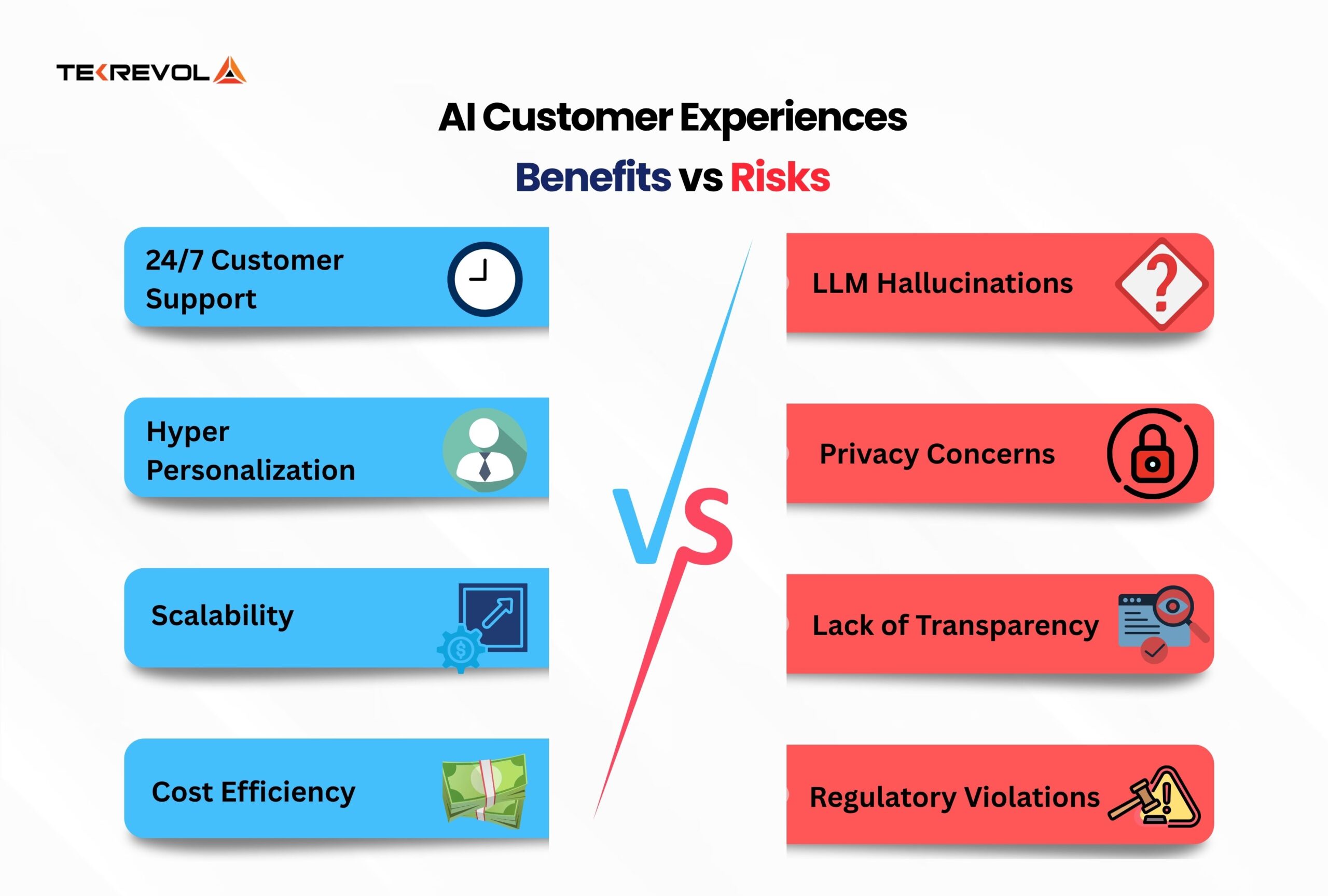
Potential Risks of Using AI Agents in Customer Experience
AI customer services can misfire if not handled correctly. The major AI adoption risks include hallucinated responses, privacy violations, and compliance issues, which compromise trust and can cost companies real money.
LLM Hallucinations
AI agents sometimes give incorrect or fabricated answers, which confuse customers and spread misinformation. Such mistakes can lead to loss of trust or even legal problems in long run.
Data Privacy & PII Exposure
AI systems often handle sensitive user data, including names, addresses, and payment info. Mishandling this data or lacking consent protocols puts brands at risk, triggering a breach or a costly lawsuit.
Customer Trust & Transparency
Customers want to know when they’re talking to a machine. If the AI fails or gives a wrong answer, it reflects on your brand. As per PwC, 38% of consumers feel uneasy about AI interactions when brands aren’t transparent.
Regulatory Compliance
Laws like GDPR, CCPA require disclosure on how AI uses customer data, and non-compliance with them means you ahev to face massive fines or bans.
Difference Between Conversational AI and Agentic AI
Conversational AI chatbots match user intent and give pre-defined replies like a help center with voice. Agentic AI, on the other hand, understands your goal, recalls context, and completes tasks across systems. It acts like a digital teammate, not just a tool.
Conversational AI vs Agentic AI
| Aspect | Conversational AI | Agentic AI |
| Core Behavior | Reactive (responds to prompts) | Proactive (executes user goals) |
| Memory Use | Limited or session-based | Persistent and context-aware |
| Personalization | Scripted replies | Real-time, behavior-driven |
| Task Handling | Single-turn questions | Multi-step processes |
| Example Use Case | FAQs, order status | End-to-end issue resolution |
| Business Impact | Faster replies | Higher task completion, fewer escalations |
According to our findings, businesses using proactive AI for customer support saw a 30% drop in issue resolution time. It’s not because the AI answered faster, but it solved the full problem.
Anticipated Future Trends in AI Customer Experience
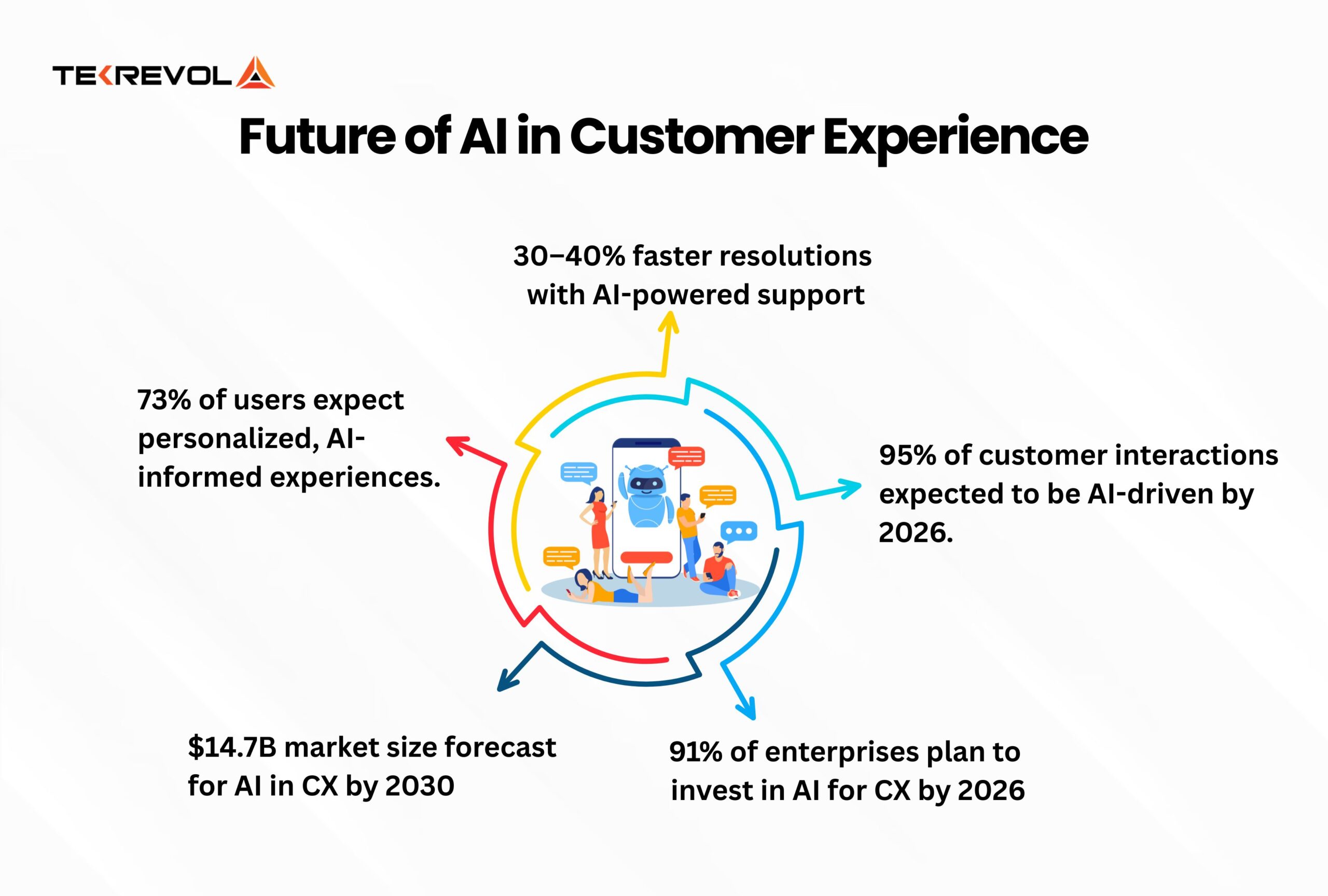
AI has grown from answering questions long ago. Now it can see, hear, predict, and remember the way customers interact with brands. Let’s see where the AI future is going:
Multimodal AI Agents
The next wave of AI customer experience will be multimodal means agents won’t just type; they’ll understand visual inputs, process voice tone, and respond across channels. Early examples include systems that combine vision, voice, and text to assist users in physical stores, mobile apps, or kiosks.
Hyper-Personalization via Graph-Based Memory
Future AI agents will build deeper profiles using graph-based memory. Instead of relying on one session, these systems connect data points across channels and timelines for dynamic personalization that improves every time a user returns.
Predictive Customer Journeys & Behavior Modeling
Using behavior modeling, future agents will preemptively offer help before users even ask. This could mean reminding a user to renew a service, offering support during a struggle, or suggesting upgrades based on patterns.
Partner with Tekrevol to Build Custom AI Agents for Customer Support
AI customer experiences are no longer optional; they’re essential for business survival. But plug-and-play bots won’t deliver the kind of experience customers expect today.
At Tekrevol, we specialize in AI agent development services that are built around your business. Using advanced LLMs, graph memory, and real-time behavior modeling, we design agents that handle real tasks across industries like healthcare, eCommerce, SaaS, and banking.
Whether you’re automating tier-one support or building a full AI support stack, we tailor each solution to your workflows and users.
Ready to scale support with AI?
Tekrevol builds secure, custom AI agents that fit your systems, tone, and business logic.
Talk to our AI team today
